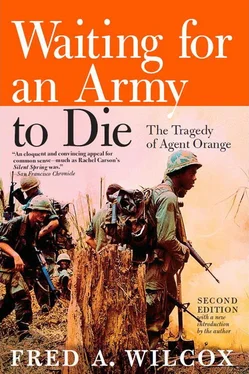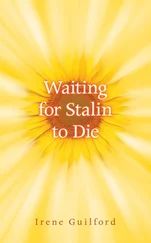Meanwhile, the five chemical companies named in the suit filed various motions to dismiss, arguing, among other things, that “its very length was an affront to the Federal Rules of Civil Procedure.” The chemical companies also held that no federal interests were involved and the veterans’ complaints should therefore be heard in state rather than federal courts. If the case were heard in state courts, Yannacone countered, “a nightmare of court administration would begin that would make the present disastrous state of affairs in the asbestos cases look like good management.”
Had the chemical companies been granted their wish and the case heard in state courts, each veteran would have been required to file and serve a document alleging that he had been an American serviceman and that while in the US military had spent time in Southeast Asia. He would also have had to document that while there he had been exposed to phenoxy herbicides such as 2,4,5-T which were “manufactured, formulated, advertised, marketed, promoted, and sold” by subsidiary corporations of the chemical company defendants, even though the companies knew that the herbicides were contaminated with “toxic synthetic organic chemicals.” Each dying or disabled veteran would then have to file a claim arguing that his illness was directly related to his exposure to herbicides. If he believed that his child or children’s birth defects were due to this exposure, he would also have to file this claim separately. The veteran’s wife or widow, or both parents of a child suffering from development defects, would have been required to file a claim. And each plaintiff would have claimed money damages ranging from $10 million to $100 million, depending on the veteran’s age or loss to his family, loss of services, and developmental damage claims. These claims would be filed and served in the home jurisdictions of each veteran, a process, says Yannacone, that could easily take more than a lifetime of all the plaintiffs involved. 2
On November 22, 1979, District Judge George C. Pratt, to whom the Multidistrict Litigation Panel had assigned the cases at Dow’s request, refused to accept the chemical companies’ motions to dismiss the complaint and grant “summary judgment in favor of the defendant war contractors.” Pratt also accepted jurisdiction as a federal question, holding that “some federal common law rule would be applied uniformly to the claims of all the veterans regardless of the state in which the action may have originated.” 3The chemical companies (war contractors) did not like this ruling and appealed, arguing that because the US was not a party, the case lacked substantial federal interest. On November 24, 1980, two Second Court of Appeals judges accepted this logic, reversing Judge Pratt and stating that there really was no “clearly identifiably federal or national interest in the outcome of the veterans’ claims sufficient to concern the federal courts as ‘federal questions.’” But Chief Justice Feinberg dissented, setting the stage for a “certiorari petition to the US Supreme Court, which caused that Court to invite the Solicitor General of the US to brief the question of national interest.”
On June 18, 1981, the US Supreme Court met in conference to examine petitions from Yannacone, and counterpetitions from the war contractor defendants, regarding the question of federal interest in the Agent Orange lawsuit. After perusing the arguments before them, the Chief Justice decided to seek opinion of the executive arm of the federal government on “the substantiality of federal interest.” To secure this opinion the court asked the attorney general to inquire into the matter. After questioning officials at the Department of Defense and Veterans Administration, who told him they could see no reason why there would be federal interest in the case, the solicitor general returned to the Supreme Court and, according to Yannacone’s associate, Keith Kavanagh, announced: “Oh my, how could you ever have thought there was any federal interest in this case? Good heavens, how misled could you be? At that point, of course, the Supreme Court denied our petition, which put us in the stance we are in now, which is diversity jurisdiction as one private party against another. But the Court, contrary to a number of misleading articles, did not dismiss the case. All they did was deny our petition because they didn’t really want to be bothered reviewing it. And by denying the petition they simply said they would allow the Court of Appeals decision to stand.”
Faced with a lawsuit on behalf of thousands of angry Vietnam veterans and their families, the war contractors resorted to what has become a classic American corporate reaction to being sued: you simply sue some “third party,” someone related tangentially but significantly to the case, to whom you can shift the blame. So Dow decided to sue the Department of Defense because, said Dow, it had sold its product to the DOD in good faith and from then on it was really the government’s responsibility to use it properly. If anyone was injured by herbicides in Vietnam, and according to Dow this remains to be proven, it was the government’s fault, not theirs. Secondly, as a government war contractor the company was only following orders; and government contractors who follow orders cannot be sued, even if the resulting action happens to injure, maim, or kill friendly troops.
Claiming that the doctrine of sovereign immunity protected it against lawsuits, the US government moved to dismiss Dow’s third-party suit. But for Dow the government’s reluctance to be sued was only a temporary setback. Even if the courts ruled negatively on Dow’s attempts to sue the government as a ‘war contractor,” Dow Chemical could not be sued. To advance this argument the corporate defendants filed a motion to dismiss the veterans’ complaints based on the claim of derivative sovereign immunity , an ancient doctrine that Yannacone says has “fallen into disfavor in this country because the people with a capital P are the sovereign. In England the sovereign was the king and of course the king could not be sued. The government of the US as a general rule can not be sued either. And there is a rule of law that during combat, mistakes, no matter how dramatic they may be, are not actionable. A classical example is the “Charge of the Light Brigade.” Somebody made a big mistake. But the survivors and the widows couldn’t sue. Because it is the duty of every soldier to go ‘Onward into the valley of death, down into the volleying and thundering’ and all the rest of that. So in Vietnam no matter how wrong the command decisions might have been the soldiers can’t complain.
“But what we’re saying in the Agent Orange lawsuit is that our soldiers ran the risk of being killed, both through the action of the enemy and the ineptitude of their leadership, but they did not accept the risk of being poisoned by their own war materials. The chemical companies say that whatever happened is not actionable in the courts of this country because it occurred during wartime and ‘we the war contractors were only following orders and are just the same as fellow soldiers. And just as you can’t sue your fellow soldier for dropping a live round, or a short round, on you, you can’t sue the company that manufactured the defective round.’
“Well, we say that is utter nonsense. The government contracted to get war materials, but under no circumstances did the government contract to have its own men poisoned or killed. [13] At the first “Defoliation Conference” sponsored by the Department of Defense and attended by several chemical companies (including Dow and Monsanto), General Fred J. Delmore, commanding general, US Army, Edgewood Arsenal, told the companies’ representatives that the DOD wanted to make sure that whatever it used for defoliants would be “perfectly innocuous to man and animals and at the same time will do the job.” Albert Hayward, chief of the program coordination office at Fort Detrick, told the conference that “it goes without saying that the materials must be applicable by ground and air spray, that they must be logistically feasible, and that they must be nontoxic to humans and livestock in the area affected.” In a 1964 press release, Dow asserted that its 2,4,5-T was absolutely nontoxic to humans or animals, but by 1965 the company confirmed that it contained TCDD. Dow also admitted that it had not informed the USDA or the DOD that it had discovered 2,4,5-T to be contaminated with TCDD.
4Therefore, the material that the contractors delivered was not what the government expected, and that means that the contractors were in fact liable. But they say, ‘No, whatever occurred did so during wartime, and we were only following orders. We’re war contractors and you can’t sue us.’ That’s their definition of derivative sovereign immunity , but it’s really no more than the good Nazi defense that was used at Nuremberg back in 1946, a defense that is a little discredited by the fact that some of the people who used it were hung. Of course, not everyone was hung, and both Krupp and I. G. Farben are back in business.” On December 29, 1980, Judge Pratt denied the chemical companies’ motion to dismiss the class action suit on the basis of derivative sovereign immunity.
Читать дальше











